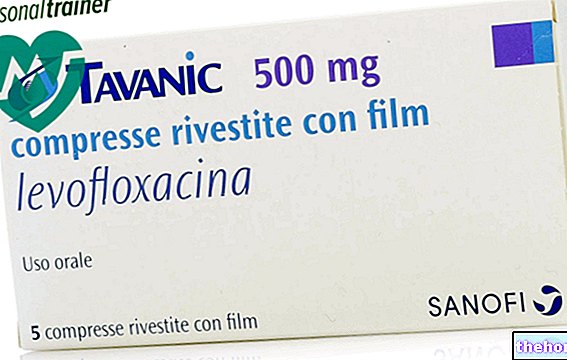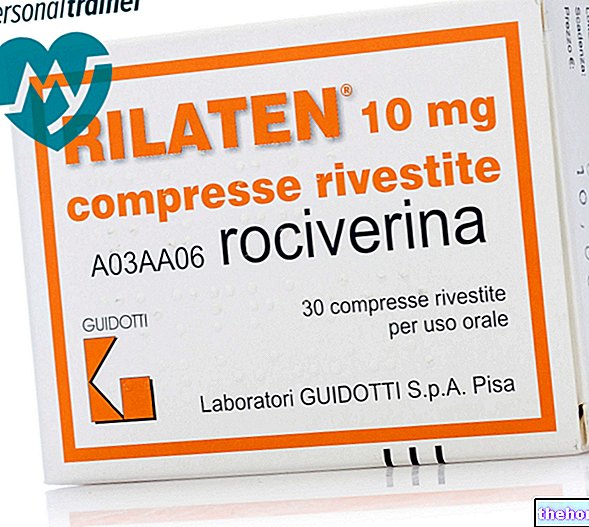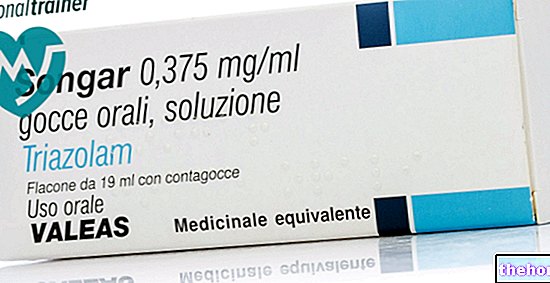Active ingredients: Clotiapine
ENTUMIN 100 mg / ml oral drops, solution
ENTUMIN 40 mg tablets
ENTUMIN 40 mg / 4 ml solution for injection
Indications Why is Entumin used? What is it for?
PHARMACOTHERAPEUTIC CATEGORY
Psycholeptic-antipsychotic.
THERAPEUTIC INDICATIONS
- Acute psychosis: acute schizophrenia, delusional episodes, manic fits, states of confusion, states of psychomotor excitement;
- Acute phases of exacerbation in the course of chronic psychosis;
- Chronic psychosis: paranoid psychosis;
- Psychoreactional or neurotic syndromes, states of anxiety.
Contraindications When Entumin should not be used
Hypersensitivity to the active substance or to any of the excipients or to other closely related substances from a chemical point of view. Comatose states or severe depressions of the CNS caused by substances with a depressive action on the S.N.C. (alcohol, barbiturates, opiates, etc.). Untreated epilepsy.
Very high doses and sudden changes in dosage are contraindicated in patients with a tendency to convulsions.
The safety of clotiapine is not demonstrated in individuals under the age of 16; therefore the use of ENTUMIN is to be reserved, in the opinion of the doctor, for cases of absolute necessity.
The risk of harmful effects on the fetus and / or infant following the intake of clotiapine is not excluded; therefore the use of ENTUMIN during pregnancy and / or breastfeeding is to be reserved, in the opinion of the doctor, for cases of absolute necessity.
Warning: intra-arterial injection must be strictly avoided.
Precautions for use What you need to know before taking Entumin
Warning: intra-arterial injections must be absolutely avoided.
In elderly patients, blood pressure should be carefully monitored.
Caution is advised in patients with a history of thrombosis, as sedation and patient immobilization caused by ENTUMIN may increase the risk of thromboembolic phenomena.
Particular caution is recommended when treating patients with prostatic hypertrophy, glaucoma, paralytic ileus, epilepsy or postencephalitic states. Caution is recommended in patients with a history of seizures and postencephalic states as ENTUMIN may cause seizures in these individuals. The same caution must also be exercised in epileptic subjects who are on anticonvulsant treatment (see "Interactions").
Caution is advised in patients with cardiovascular disease due to the possibility that ENTUMIN increases heart rate and / or leads to hypotension. For the treatment of hypotensive episodes, see the "Overdose" and "Interactions" section.
Class effects
An increased risk of cerebrovascular adverse events has been observed in a population of patients with dementia treated with some atypical antipsychotics. The mechanism of this increased risk is unknown.
An increased risk for other antipsychotics or other patient populations cannot be excluded. Entumin should be used with caution in patients with stroke risk factors.
In elderly patients with dementia-related psychosis, the efficacy and safety of Entumin have not been studied. Observational studies suggest that elderly patients with dementia-related psychosis, treated with antipsychotics, are at increased risk of death. In the literature, the factors Risks that may predispose this patient population to increased risk of death when treated with antipsychotics include sedation, the presence of heart conditions (eg, cardiac arrhythmia) or lung conditions (eg, aspiration and non-aspiration pneumonia). when treating dementia patients with Entumin.
Cases of venous thromboembolism (VTE) have been reported with antipsychotics. As patients treated with antipsychotics often present with acquired risk factors for VTE, all possible risk factors for VTE should be identified before and during treatment with Entumin and preventive measures undertaken.
As with other antipsychotics, use with caution in patients with cardiovascular disease or a family history of QT prolongation and when Entumin is prescribed with drugs known to increase the QTc interval.
Avoid concomitant therapy with other neuroleptics.
Events of leukopenia / neutropenia temporally related to antipsychotic agents have been reported in clinical studies and / or in postmarketing experience. Agranulocytosis has also been reported. Possible risk factors for leukopenia / neutropenia include low white blood cell (WBC) count. ) and a history of drug-induced neutropenia / leukopenia. In patients with a clinically significant history of low WBC or drug-induced neutropenia / leukopenia, complete blood counts with leukocyte formula should be monitored frequently during the first months of therapy and at the first sign. of a clinically significant decrease in WBCs, in the absence of other causative factors, discontinuation of Entumin should be considered. Patients with clinically significant neutropenia should be carefully monitored for fever and other symptoms or signs of infection and treated promptly if such symptoms or signs appear Patients with neutrop severe enia (absolute neutrophil count
ENTUMIN should be used with appropriate care in women with breast cancer.
The antiemetic effect of ENTUMIN can mask the signs of overdosing of other drugs or it can make it more difficult to diagnose concomitant diseases, especially of the digestive tract or CNS such as intestinal obstruction, brain tumors, Reye's syndrome.
Since the risk of persistent delayed dyskinesias (see "Undesirable effects") has been correlated with the duration of therapy, chronic treatment with ENTUMIN should be reserved for those patients with conditions that respond to the drug and for whom appropriate therapy is not possible. alternative. The doses and duration of treatment should be the minimum in order to obtain a satisfactory clinical response. In the case of prolonged treatments, the possibility of ocular toxicity (pigment retinopathy) cannot be excluded, therefore it is advisable to schedule a periodic eye check-up.
Interactions Which drugs or foods can modify the effect of Entumin
Tell your doctor or pharmacist if you have recently taken any other medicines, even those without a prescription.
When neuroleptics are administered concomitantly with QT prolonging drugs, the risk of developing cardiac arrhythmias increases.
Caution should therefore be exercised when Entumin is prescribed with such drugs.
Do not administer concomitantly with drugs that cause electrolyte disturbances.
ENTUMIN can enhance:
- the central effects of alcohol, sedatives, analgesics, narcotics, hypnotics, MAO-inhibitors and antihistamines;
- the hypotensive action of antihypertensive drugs;
- the toxicity of lithium.
Before taking any other medicines in addition to ENTUMIN, consult your doctor, as there are many medicines that interfere with ENTUMIN.
A drug, either prescription or over-the-counter, may require dosage adjustment when given concurrently with ENTUMIN. The association of clotiapine with anticholinergics, including those with anticholinergic action used in antiparkinsonian therapy, requires caution since the appearance of characteristic undesirable effects may be favored, such as: disturbed vision (blurred vision, etc.), constipation, dry mouth, urinary retention, etc. and possible increase in intraocular pressure.
The combination of ENTUMIN with Levodopa is not recommended. For the treatment of hypotension, do not use epinephrine, as its use may further lower blood pressure. In epileptic subjects, the use of clotiapine may make it necessary to adjust the specific therapy.
Warnings It is important to know that:
Pregnancy and breastfeeding
Ask your doctor or pharmacist for advice before taking any medicine.
During therapy, inform your doctor if you are pregnant. It is also necessary to consult it if you wish to proceed with breastfeeding: it is necessary to decide whether to give up breastfeeding the infant and start the treatment or vice versa to continue breastfeeding avoiding the administration of the medicine.
The following symptoms have been observed in newborn babies of mothers who have taken conventional or atypical antipsychotics, including ENTUMIN, during the last trimester (last three months of pregnancy): shaking, muscle stiffness and / or weakness, sleepiness, agitation, breathing problems and difficulty in food intake. If your child shows any of these symptoms, contact your doctor.
Effects on ability to drive and use machines
ENTUMIN may impair the ability to drive or operate machinery. Important information about some of the ingredients ENTUMIN 40 mg tablets contain lactose: in case of ascertained intolerance to sugars contact your doctor before taking the medicine. ENTUMIN 100 mg / ml oral drops, solution contains small amounts of ethyl alcohol. For those who carry out sports activities, the use of medicines containing ethyl alcohol can determine positive anti-doping tests in relation to the alcohol concentration limits indicated by some sports federations.Dosage and method of use How to use Entumin: Dosage
The first phase of treatment is to be carried out, if possible, in a hospital environment, and in any case under the continuous and rigorous control of the doctor.
The product must be taken on an empty stomach, for short periods of time and with wide intervals between said periods. For the attack therapy of the acute phases of psychosis, daily doses of 100 - 120 mg by i.m. or i.v., or alternatively orally in divided doses, are recommended, to be gradually reached over a period of 4 - 5 days.
This dosage should be maintained for several weeks, in relation to the evolution of the clinical picture. In case of need, especially in acute excitement pictures, the daily dose can be increased up to a maximum of 360 mg per day.
For maintenance therapy in psychosis the dose is gradually reduced to 40 - 60 mg (12-18 drops) orally per day. In many cases, even a lower maintenance dosage, which can last for a very long time, is effective in preventing relapses.
In clinical pictures of a neurotic and psychoreactional nature, doses of 10 - 30 mg (3-9 drops) per day are sufficient.
In the treatment of elderly patients, the posology must be carefully established by the doctor who will have to evaluate a possible reduction of the dosages indicated above.
Overdose What to do if you have taken too much Entumin
In case of accidental intake of an excessive dose of ENTUMIN, notify your doctor immediately or go to the nearest hospital.
Symptoms: somnolence, hypotension, tachycardia, arrhythmia, respiratory depression, extrapyramidal symptoms, convulsions and coma. Treatment: gastric lavage followed by administration of activated charcoal.
For hypotension: plasma expanders. If treatment with a vasopressor (eg dopamine) proves necessary, as occurs in resistant cases, the patient should be carefully monitored, especially cardiovascular function. Never use adrenaline as it could occur. a further lowering of pressure.
For seizures: benzodiazepines.
Side Effects What are the side effects of Entumin
Like all medicines, ENTUMIN can cause side effects, although not everybody gets them.
Adverse reactions are listed in order of decreasing frequency as follows: very common (≥ 1/10), common (≥ 1/100 to <1/10), uncommon (≥ 1 / 1,000 to <1/100), rare (≥ 1 / 10,000 to <1 / 1,000), very rare (<1 / 10,000), not known (cannot be estimated from the available data).
Psychiatric disorders
Uncommon: Agitation, confusional state
Nervous system disorders
Uncommon: extrapyramidal symptoms, dystonia, akathisia, parkinsonism, tardive dyskinesia, sedation
Rare Hypokinesia, tremors
Eye disorders
Uncommon: Vision blurred
Vascular pathologies
Uncommon Orthostatic hypotension
Gastrointestinal disorders
Uncommon: Dry mouth, constipation
Pregnancy, puerperium and perinatal conditions
Neonatal withdrawal syndrome, frequency not known, extrapyramidal symptoms (See section 4.6)
Class effects
Events of leukopenia / neutropenia temporally related to antipsychotic agents have been reported. Agranulocytosis has also been reported.
Cases of venous thromboembolism, including cases of pulmonary embolism and cases of deep vein thrombosis, have been reported with antipsychotic drugs - Frequency not known.
Rare cases of QT prolongation, ventricular arrhythmias such as torsades de pointes, ventricular tachycardia, ventricular fibrillation and cardiac arrest have been observed with ENTUMIN or other drugs of the same class.
Very rare cases of sudden death.
Like all other neuroleptics, ENTUMIN can induce postural hypotension, tachycardia, syncope and anticholinergic effects, such as dry mouth, visual disturbances, constipation, especially at the beginning of treatment.
Effects on the CNS rarely occur. such as: sedation, agitation and confusional states, extrapyramidal symptoms, paroxysmal dystonia, hypokinesia, tremor, rigidity or akathisia. Dystonias and akathisia are more frequent in children, while signs of parkinsonism prevail in the elderly, especially if they have organic brain lesions.
Dystonias include spasms of the muscles of the neck and trunk up to stiff neck and opisthotonus, oculogyric crisis, trismus, protrusion of the tongue and carpo-breech spasms. These reactions appear very early and disappear within 24 - 48 hours after discontinuation of therapy. Very rarely, dystonia can cause laryngospasm associated with cyanosis and asphyxia.
Akathisia is characterized by motor restlessness and sometimes by insomnia.
More frequent in the first days of therapy, it can also appear late. Disorders often regress spontaneously, otherwise they can be well controlled by reducing the dosage or combining an antiparkinsonian anticholinergic. Generally, the onset and severity of many of the extrapyramidal symptoms (akinesia, rigidity, tremor at rest, etc.) are dose related and require the administration of antiparkinsonian drugs. In persistent cases, dose reduction or discontinuation of treatment may be necessary. Anticholinergic antiparkinsonian drugs should not be routinely prescribed as a prophylactic measure, as the latter may decrease the therapeutic efficacy of ENTUMIN.
Late persistent dyskinesias occur mostly during long-term therapy and with high doses, even in the period following drug discontinuation. The elderly and women are more frequently affected. They consist of rhythmic movements of the tongue, lips and face, more rarely of the extremities and are generally preceded by fine vermicular movements of the tongue.Discontinuation of therapy can prevent the development of symptoms, for which a specific therapy is not known. Periodic reduction of the dosage of neuroleptics, if clinically possible, can help to recognize the onset of tardive dyskinesia early.
Other possible side effects: galactorrhea (spontaneous leaking of milk from the breast), amenorrhea (interruption of menstruation), gynecomastia (breast enlargement), hyperprolactinaemia. The product can induce neurotoxic manifestations, at doses higher than those recommended, in patients with renal insufficiency and in patients with Central Nervous System disorders.
As with all antipsychotic drugs, Neuroleptic Malignant Syndrome (NMS) has been reported as a very rare undesirable effect during post-marketing experience with Entumin. Clinical manifestations of this syndrome are: hyperpyrexia, muscle stiffness, akinesia, vegetative disorders (irregularity of pulse and blood pressure, sweating, tachycardia, arrhythmias); changes in consciousness that can progress to stupor and coma. The treatment of NMS consists in immediately stopping the administration of antipsychotic and other non-essential drugs and in institute intensive symptomatic therapy (particular care must be taken in reducing hyperthermia and in correcting dehydration). If the resumption of treatment with antipsychotics is deemed essential, the patient must be carefully monitored.
Compliance with the instructions contained in the package leaflet reduces the risk of undesirable effects.
If any of the side effects gets serious or if you notice any side effects not listed in this leaflet, please tell your doctor or pharmacist.
Expiry and Retention
Expiry: see the expiry date printed on the package.
The expiry date indicated refers to the product in intact packaging, correctly stored.
Warning: do not use the medicine after the expiry date shown on the package.
Keep this medicine out of the reach and sight of children.
Medicines should not be disposed of via wastewater or household waste. Ask your pharmacist how to throw away medicines you no longer use. This will help protect the environment.
Deadline "> Other information
Composition
ENTUMIN 100 mg / ml oral drops, solution
1 ml (= 30 drops) of solution contains:
Active ingredient: clotiapine 100 mg
Excipients: benzoic acid, saccharin, soluble lemon essence, 96% ethanol, tartaric acid, soluble grapefruit essence, glycerol, propylene glycol, purified water.
ENTUMIN 40 mg tablets
1 tablet contains:
Active ingredient: clotiapine 40 mg
Excipients: corn starch, lactose monohydrate, liquid paraffin, gelatin, anhydrous colloidal silica, talc, magnesium stearate.
ENTUMIN 40 mg / 4 ml solution for injection
1 ml of solution for injection contains:
Active ingredient: clotiapine 10 mg
Excipients: concentrated hydrochloric acid, propylene glycol, water for injections.
Pharmaceutical forms and content
ENTUMIN 100 mg / ml oral drops, solution
1 bottle of 10 ml
ENTUMIN 40 mg tablets
30 tablets of 40 mg
ENTUMIN 40 mg / 4 ml solution for injection
10 ampoules of solution for injection for intramuscular or intravenous use
Source Package Leaflet: AIFA (Italian Medicines Agency). Content published in January 2016. The information present may not be up-to-date.
To have access to the most up-to-date version, it is advisable to access the AIFA (Italian Medicines Agency) website. Disclaimer and useful information.
01.0 NAME OF THE MEDICINAL PRODUCT -
ENTUMIN
02.0 QUALITATIVE AND QUANTITATIVE COMPOSITION -
100 mg / ml oral drops, solution
1 ml (= 30 drops) of oral solution contains:
Active principle:
clotiapine 100 mg
40 mg tablets
1 tablet contains:
Active principle:
clotiapine 40 mg
40 mg / ml solution for injection
1 ml of solution for injection contains:
Active principle:
clotiapine 10 mg
03.0 PHARMACEUTICAL FORM -
Oral drops, solution.
Tablets.
Solution for injection for intramuscular or intravenous use.
04.0 CLINICAL INFORMATION -
04.1 Therapeutic indications -
Acute psychosis: acute schizophrenia, delusional episodes, manic fits, states of confusion, states of psychomotor excitement;
Acute phases of exacerbation in the course of chronic psychosis;
Chronic psychosis: paranoid psychosis;
Psychoreactional or neurotic syndromes, states of anxiety.
04.2 Posology and method of administration -
The first phase of treatment is to be carried out, if possible, in a hospital environment, and in any case under the continuous and rigorous control of the doctor.
The product must be taken on an empty stomach, for short periods of time and with wide intervals between said periods.
For the attack therapy of the acute phases of psychosis, daily doses of 100-120 mg im or iv, or alternatively orally in divided doses, are recommended, to be gradually reached over a period of 4-5 days. maintained for several weeks, in relation to the evolution of the clinical picture. If necessary, especially in cases of acute excitement, the daily dose can be increased up to a maximum of 360 mg per day.
For maintenance therapy in psychoses the dose is gradually reduced to 40-60 mg (12-18 drops) orally per day. In many cases, even a lower maintenance dosage, which can last for a very long time, is effective in preventing relapses.
In neurotic and psychoreactional clinical pictures, doses of 10-30 mg (3-9 drops) per day are sufficient.
In the treatment of elderly patients, the posology must be carefully established by the doctor who will have to evaluate a possible reduction of the dosages indicated above.
04.3 Contraindications -
Hypersensitivity to the components or to other closely related substances from a chemical point of view. Comatose states or severe depressions of the CNS caused by substances with a depressive action on the S.N.C. (alcohol, barbiturates, opiates, etc.). Untreated epilepsy. Very high doses and sudden changes in dosage are contraindicated in patients with a tendency to convulsions.
The safety of clotiapine is not demonstrated in individuals under the age of 16; therefore the use of ENTUMIN is to be reserved in the opinion of the doctor, for cases of absolute necessity.
The risk of harmful effects on the fetus and / or infant following the intake of clotiapine is not excluded; therefore the use of ENTUMIN during pregnancy and / or breastfeeding is to be reserved, in the opinion of the doctor, for cases of absolute necessity.
Attention : Intra-arterial injection should be strictly avoided.
04.4 Special warnings and appropriate precautions for use -
Caution is advised in patients with a history of seizures and postencephalitic states, as clotiapine lowers the seizure threshold. The same caution must also be exercised in epileptic subjects who are on anticonvulsant treatment (see "Interactions").
Use with caution in patients with cardiovascular disease or a family history of QT prolongation.
Avoid concomitant therapy with other neuroleptics.
Caution is advised in patients with cardiovascular disease. Tachycardia and hypotension are reported as undesirable effects. For the treatment of hypotensive episodes see the sections "Interactions" and "Overdose". In elderly patients, blood pressure should be carefully monitored.
Caution is advised in patients with a history of thrombosis, as sedation and patient immobilization caused by ENTUMIN may increase the risk of thromboembolic phenomena, due to the possible anticholinergic action.
Prolonged doses cause an increase in the plasma level of prolactin, therefore ENTUMIN should be used with appropriate care in women with breast cancer.
The antiemetic effect of ENTUMIN can mask the signs of overdosing of other drugs or it can make it more difficult to diagnose concomitant diseases, especially of the digestive tract or CNS such as intestinal obstruction, brain tumors, Reye's syndrome.
Since the risk of persistent late dyskinesias has been correlated with the duration of therapy, chronic treatment with ENTUMIN should be reserved for those patients with drug-responsive conditions for whom appropriate alternative therapy is not possible. The doses and duration of treatment should be the minimum in order to obtain a satisfactory clinical response. In the case of prolonged treatments, the possibility of ocular toxicity (pigment retinopathy) cannot be excluded, therefore it is advisable to schedule a periodic eye check-up.
Particular caution is recommended in the treatment of patients with glaucoma, paralytic ileus, urinary retention (prostatic hypertrophy).
In randomized clinical trials versus placebo, conducted in a population of patients with dementia, treated with some atypical antipsychotics, an approximately three-fold increase in the risk of cerebrovascular events was observed. The mechanism of this increased risk is unknown.
An increased risk for other antipsychotics or other patient populations cannot be excluded. Entumin should be used with caution in patients with stroke risk factors.
04.5 Interactions with other medicinal products and other forms of interaction -
When neuroleptics are administered concomitantly with QT prolonging drugs, the risk of developing cardiac arrhythmias increases.
Do not administer concomitantly with drugs that cause electrolyte disturbances.
ENTUMIN can enhance:
the central effects of alcohol, sedatives, analgesics, narcotics, hypnotics, MAO-inhibitors and antihistamines;
the hypotensive action of antihypertensive drugs;
the toxicity of lithium.
Caution requires the association of clotiapine with anticholinergics, including those with anticholinergic action, used in antiparkinsonian therapy, since the appearance of characteristic undesirable effects such as: vision disturbances, constipation, urinary retention, dry mouth, etc. may be favored. increased intraocular pressure.
The association with Levodopa is to be avoided. In case of treatment of extrapyramidal symptoms (see "Undesirable effects") do not use Levodopa.
Do not use epinephrine for the treatment of hypotension as its use in patients with partial adrenergic blockade may further lower blood pressure.
Due to the known effect of clotiapine on the seizure threshold in epileptic subjects, an adjustment of specific therapy may be necessary.
04.6 Pregnancy and breastfeeding -
During pregnancy and breastfeeding, the drug should only be administered in case of absolute necessity and under direct medical supervision (see "Contraindications").
04.7 Effects on ability to drive and use machines -
Like all psychiatric drugs, ENTUMIN can decrease the ability to drive motor vehicles or operate machinery.
04.8 Undesirable effects -
Rare cases of QT prolongation, ventricular arrhythmias such as torsades de pointes, ventricular tachiacardia, ventricular fibrillation and cardiac arrest have been observed with ENTUMIN or other drugs of the same class.
Very rare cases of sudden death.
Like all other neuroleptics, ENTUMIN can induce postural hypotension, tachycardia, syncope and anticholinergic effects, such as dry mouth, visual disturbances, constipation, especially at the beginning of treatment.
Effects on the CNS rarely occur. such as: sedation, agitation and confusional states, extrapyramidal symptoms, paroxysmal dystonia, hypokinesia, tremor, rigidity or akathisia.
Dystonias and akathisia are more frequent in children, while signs of parkinsonism prevail in the elderly, especially those with organic brain lesions. Dystonias include spasms of the neck and trunk muscles up to stiff neck and opisthotonus, oculogyric crisis, trismus, protrusion of the tongue and carpo-breech spasms.
These reactions appear very early and disappear within 24 to 48 hours of discontinuing therapy. Very rarely, dystonia can cause laryngospasm associated with cyanosis and asphyxia.
Akathisia is characterized by motor restlessness and sometimes by insomnia. More frequent in the first days of therapy, it can also appear late. The disorders often regress spontaneously, otherwise they can be well controlled by reducing the dosage or by combining an antiparkinsonian anticholinergic. onset and severity of many of the extrapyramidal symptoms (akinesia, rigidity, tremor at rest, etc.) are dose related and require the administration of antiparkinsonian drugs. In persistent cases, dose reduction or discontinuation may be necessary Anticholinergic antiparkinsonian drugs should not be routinely prescribed as a prophylactic measure, as the latter may decrease the therapeutic efficacy of ENTUMIN.
Late persistent dyskinesias occur mostly during long-term therapy and with high doses, even in the period following drug discontinuation. The elderly and women are more frequently affected. They consist of rhythmic movements of the tongue, lips and face, more rarely of the extremities and are generally preceded by fine vermicular movements of the tongue. Discontinuation of therapy can prevent the development of symptoms, for which a specific therapy is not known. Periodic reduction of neuroleptic dosage, if clinically possible, can help to recognize the onset of tardive dyskinesia early.
Other possible side effects: galactorrhea, amenorrhea, gynaecomastia, hyperprolactinaemia.
The product can induce neurotoxic manifestations, at doses higher than those recommended, in patients with renal insufficiency and in patients with central nervous system disorders.
A potentially fatal symptom complex called Neuroleptic Malignant Syndrome has been reported during treatment with antipsychotic drugs. Clinical manifestations of this syndrome are: hyperpyrexia, muscle stiffness, akinesia, vegetative disorders (irregularities in the pulse and blood pressure, sweating, tachycardia, arrhythmias); changes in consciousness which can progress to stupor and coma. The treatment of the S.N.M. it consists in immediately suspending the administration of antipsychotic drugs and other non-essential drugs and in instituting intensive symptomatic therapy (particular care must be taken to reduce hyperthermia and correct dehydration). If the resumption of antipsychotic treatment is deemed essential, the patient should be carefully monitored.
04.9 Overdose -
For overdose, in particular conditions, symptoms such as drowsiness, hypotension, tachycardia, arrhythmia, respiratory depression, extrapyramidal symptoms, convulsions and coma may occur.
Non-specific treatment: gastric lavage followed by administration of activated charcoal.
Symptomatic treatment, if necessary:
for hypotension: plasma expanders. If treatment with a vasopressor (eg dopamine) proves necessary, as occurs in resistant cases, the patient should be carefully monitored, especially cardiovascular function. Never use adrenaline, as ENTUMIN may block its hypertensive action and further lowering of blood pressure may occur.
for seizures: benzodiazepines.
05.0 PHARMACOLOGICAL PROPERTIES -
05.1 "Pharmacodynamic properties -
ENTUMIN is a synthetic psychopharmaceutical with neuroleptic action and has the fundamental characteristics of major neuroleptics. First of all, it has a sedative effect, reduces the level of psychomotor activity and regulates sleep. Consequently, it relieves anxiety and the sense of tension, has a good antipsychotic effect and helps the patient to re-establish contact with the environment. Its main advantage is its good intravenous tolerability and the absence of organ toxicity (liver, eyes, skin).
ENTUMIN does not affect the autonomic nervous system, as demonstrated by the substantial invariability of the parameters examined such as pupil diameter, salivation, heart rate and intestinal function.
05.2 "Pharmacokinetic properties -
Experiments with labeled compound administered per os and i.v. in mice and rats showed that clotiapine is rapidly and significantly absorbed from the gastrointestinal tract. It is excreted just as quickly: 80 - 90% of the administered dose was in fact found in the faeces and urine 24 hours after administration. Excretion occurs mainly via the faecal route.
In mice, distribution studies in the organism with labeled clotiapine show a rapid transfer from the plasma compartment: within 24 hours of oral administration and 5 minutes of intravenous administration, all the organs examined show a specific activity higher than that of blood.
05.3 Preclinical safety data -
The oral LD50 in mice, rats and guinea pigs was respectively 272 - 480 - 154 mg / kg.
Subacute toxicity studies have shown that ENTUMIN, even at doses significantly higher than the maximum human therapeutic dose, did not induce noteworthy changes in the parameters examined.
ENTUMIN is not teratogenic, nor has it been shown to affect fertility.
06.0 PHARMACEUTICAL INFORMATION -
06.1 Excipients -
100 mg / ml oral drops, solution:
Benzoic acid, saccharin, soluble lemon essence, 96% ethanol, tartaric acid, soluble grapefruit essence, glycerol, propylene glycol, purified water.
40 mg tablets:
Corn starch, lactose monohydrate, liquid paraffin, gelatin, anhydrous colloidal silica, talc, magnesium stearate.
40 mg / 4 ml solution for injection:
Concentrated hydrochloric acid, propylene glycol, water for injections.
06.2 Incompatibility "-
None.
06.3 Period of validity "-
100 mg / ml oral drops, solution: 2 years
40 mg tablets: 5 years
40 mg / 4 ml solution for injection: 4 years
06.4 Special precautions for storage -
None.
06.5 Nature of the immediate packaging and contents of the package -
100 mg / ml oral drops, solution
1 glass bottle of 10 ml
40 mg tablets
Opaque PVC blister containing 30 tablets
40 mg / 4 ml solution for injection
10 glass vials of 4 ml
06.6 Instructions for use and handling -
Oral drops, solution:
The bottle is equipped with a safety closure.
To open the bottle, follow the instructions given in the package leaflet.
Injectable solution:
This is a vial with an OPC (One Point Cut) pre-breaking system.
To open the vial correctly, you must follow the instructions in the package leaflet.
07.0 HOLDER OF THE "MARKETING AUTHORIZATION" -
Novartis Farma S.p.A.
Largo Umberto Boccioni, 1 - 21040 Origgio (VA)
08.0 MARKETING AUTHORIZATION NUMBER -
100 mg / ml oral drops, solution
A.I.C. n. 021553021
40 mg tablets
A.I.C. n. 021553019
40 mg / 4 ml solution for injection
A.I.C. n. 021553033
09.0 DATE OF FIRST AUTHORIZATION OR RENEWAL OF THE AUTHORIZATION -
100 mg / ml oral drops, solution
Authorization: 03.02.1970 Renewal: 01.06.2005
40 mg tablets
Authorization: 03.02.1970 Renewal: 01.06.2005
40 mg / 4 ml solution for injection
Authorization: 05.12.1970 Renewal: 01.06.2005
10.0 DATE OF REVISION OF THE TEXT -
28/02/2007




























